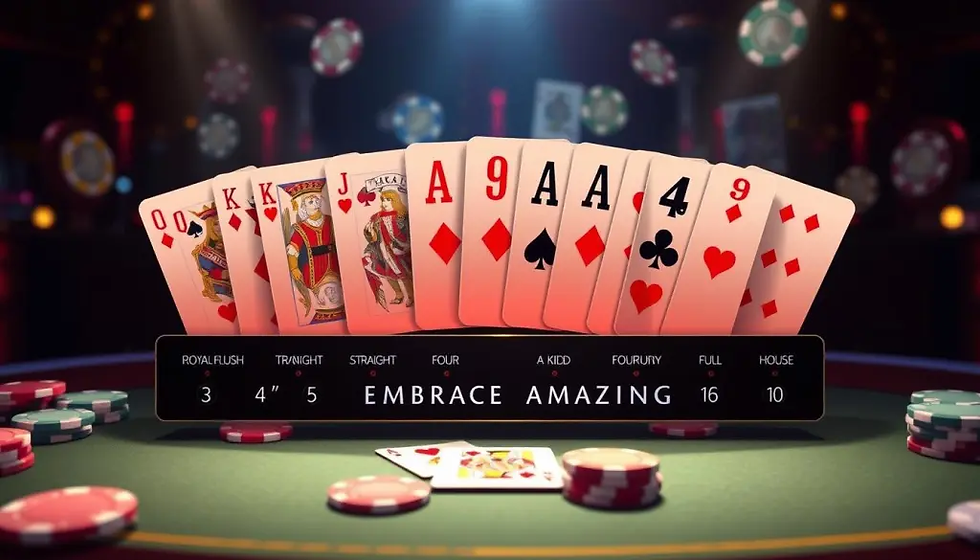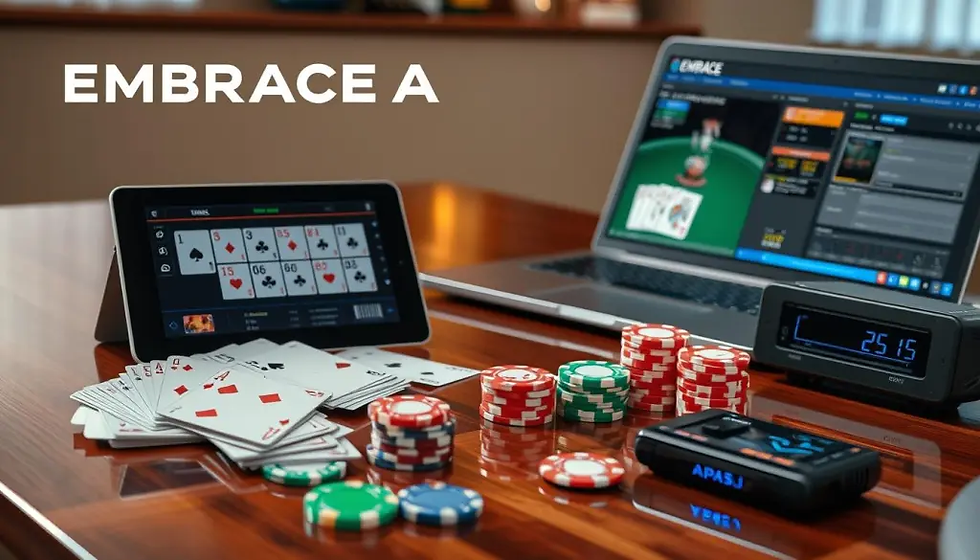P0KER HOW TO PLAY AS BEGINNER TO BE A PRO Guide 2024
- Lady Janice

- Dec 30, 2024
- 11 min read
Are you ready to dive into the exciting world of poker? This guide will help you go from a beginner to a pro. We'll cover the basics and advanced strategies to help you win.
Whether you're new to poker or aiming for the big leagues, this 2024 guide is here for you. It's your key to becoming a poker master.
Key Takeaways
Discover the essential poker rules and gameplay flow to get started
Explore the diverse poker variants and understand their unique dynamics
Master the art of poker hand rankings and probability calculations
Develop strategic decision-making skills for pre-flop, post-flop, and river play
Learn to read your opponents and recognize their tells for an edge
Understanding Basic Poker Rules and Game Flow -P0KER HOW TO PLAY
Poker is a card game loved by many around the world. It's great for both newbies and seasoned players. We'll cover the basics, including different poker types, the role of table positions, and how a hand unfolds.
Different Poker Variants Explained
Poker comes in many forms, each with its own rules and strategies. From Texas Hold'em to Omaha, each game offers unique challenges. Knowing these differences is key for any poker player.
Poker Table Positions and Their Importance
Your seat at the table greatly affects your play. The dealer acts last, giving them an edge. Early position players face more uncertainty. Understanding these positions is vital for a good strategy.
Basic Gameplay Structure
Poker's core is its betting rounds and card deals. From the deal to the river, each step offers challenges and choices. Knowing the hand's flow is crucial for success.
Betting Round | Cards Dealt | Player Actions |
Pre-Flop | Two hole cards | Ante, Blinds, Bet, Fold, Call, Raise |
Flop | Three community cards | Bet, Fold, Call, Raise |
Turn | One additional community card | Bet, Fold, Call, Raise |
River | One final community card | Bet, Fold, Call, Raise |
Showdown | N/A | Reveal hole cards, determine winner |
Learning the basics, game types, positions, and gameplay is essential. This knowledge will help you improve your poker skills. Stay with us as we explore more strategies in the next sections.
P0KER HOW TO PLAY AS BEGINNER TO BE A PRO

Starting your journey from beginner to poker pro takes hard work, smart thinking, and a desire to keep learning. As a beginner, it's key to learn the game's basics. This means knowing the rules, trying out different poker games, and understanding the role of your table position. By focusing on these basics, you'll build a strong foundation for becoming a skilled p0ker player.
Improving your p0ker skills also means learning effective poker strategies. This includes making smart choices before the flop, handling situations after the flop, and making good decisions on the river. By studying and applying proven strategies, you'll get better at making smart decisions at the table.
Good p0ker players also know how to read their opponents and spot tells. Paying attention to body language, betting patterns, and other small signs can help you guess what your opponents have. Getting better at this will help you make smarter choices and gain an edge over your opponents.
The journey from beginner to pro in p0ker is all about consistent practice, learning, and being open to change. By growing your knowledge, improving your strategies, and getting better at reading opponents, you can turn from a beginner into a strong p0ker player. With hard work and a love for the game, you can start an exciting journey to becoming a p0ker pro.
"The key to becoming a successful p0ker player is to never stop learning and improving your game." - Phil Ivey, professional p0ker player
Essential Poker Hand Rankings Every Player Must Know

Knowing the poker hand rankings is key to winning. From the rare Royal Flush to the common High Card, learning these rankings helps a lot. We'll cover the hand hierarchy, the chances of getting each hand, and how hands compare to each other.
Royal Flush to High Card: Complete Hand Hierarchy
The rankings, from top to bottom, are:
Royal Flush: The best hand, with Ace, King, Queen, Jack, and Ten of the same suit.
Straight Flush: Five cards of the same suit in order.
Four of a Kind: Four cards of the same rank.
Full House: A mix of Three of a Kind and a Pair.
Flush: Five cards of the same suit, but not in order.
Straight: Five cards in order, but not all the same suit.
Three of a Kind: Three cards of the same rank.
Two Pair: Two cards of one rank and two of another.
One Pair: Two cards of the same rank.
High Card: No special combinations.
Probability of Making Different Hands
The chance of getting each hand varies. The Royal Flush is very rare, while the High Card is common. Knowing these odds helps you play smarter and set realistic goals.
Common Hand Matchups
When players have strong hands, knowing how they compare is crucial. For example, a Straight Flush beats Four of a Kind. A Full House beats a Flush. Learning these matchups helps you predict outcomes and make better choices.
Learning the poker hand rankings is vital for any player. By understanding the hierarchy, the odds of each hand, and how hands compare, you'll make better decisions at the table.
Mastering Poker Betting Fundamentals

Learning poker betting can change your game. It's key to get better and win more. We'll cover the basics to make you a better bettor.
Bet Sizing: The Key to Maximizing Value
Bet sizing is very important in poker. Choosing the right bet size can help you win big or lose less. It's about getting the most from your good hands and losing less with bad ones.
Position-Based Betting Strategies
Your position at the table matters a lot. Players in late position have an edge because they see what others do first. Using this to your advantage is crucial for winning.
The Art of Bluffing
Bluffing is a strong tool in poker. It's about knowing when and how to bluff, and reading your opponents. Good bluffing can throw off your opponents and give you an edge.
Learning poker betting basics is a journey. But it's worth it. With bet sizing, position, and bluffing, you'll make better decisions. Use these poker betting techniques and poker strategies to improve your game.
Strategic Thinking and Decision Making

To be good at poker, you need more than just knowing hand rankings. You must think strategically and make smart decisions at every turn. We'll dive into the details of choosing hands before the flop, making decisions after the flop, and playing the river.
Pre-flop Strategy
The pre-flop stage is key to the whole hand. It's crucial to master poker strategies here. Think about your position, how much money you have, and what your opponents might do.
Knowing the poker odds and probability of your starting hands helps you make better choices. This way, you can increase your chances of winning.
Post-flop Decision Points
When the flop, turn, and river cards are revealed, new choices come up. Adjusting your strategy based on the board and your position is vital. Analyzing the poker odds and probability of improving your hand or getting beaten is key.
This helps you make confident decisions during these critical moments.
River Play Considerations
Pot size and bet sizing: Understand how to size your bets based on the pot and the potential risk-reward ratio.
Opponent tendencies: Observe how your opponents have played throughout the hand and adjust your river strategy accordingly.
Balancing bluffs and value bets: Knowing when to bluff or value bet can be a game-changer in the high-stakes river decisions.
By adding these strategic elements to your game, you'll improve your skills and success at poker. Remember, poker strategies grow with experience and a deeper understanding of the game.
Reading Opponents and Recognizing Tells

In the world of poker, learning to read opponents and spot their tells is key. Tells, both physical and behavioral, show a player's emotions and hand strength. Knowing this can help you win more games.
Physical tells include changes in facial expressions or body language. A twitch, posture shift, or nervous glance can show a player's confidence or doubt. By noticing these signs, you can understand your opponent's hand better and plan your moves.
Look at your opponents' eye movements and breathing. Quick blinking or shallow breathing might mean they're uncomfortable or hiding something.
Watch for habits like fidgeting with chips or touching their face. These can show a player's confidence or anxiety.
Pay attention to betting patterns and sizes. Changes in betting can tell you about a player's hand strength.
Online poker lacks physical tells, but you can still use psychological ones. Timing, betting habits, and game interaction can reveal a player's thought process and strategy.
"The ability to read opponents is not just a skill, but a powerful weapon in the arsenal of a successful poker player."
Improving your ability to read opponents and spot tells will help you make better decisions at the table. This skill is crucial for success and fun in poker, whether playing live or online.
Bankroll Management for Long-term Success

Managing your bankroll is key for any poker player aiming for success. It's not just about the excitement of playing. It's about making sure your poker career is both long-lasting and profitable. Here, we'll look at the main principles of bankroll management to help you through poker's ups and downs.
Setting Limits and Goals
First, set limits and goals for your bankroll. Decide how much you can risk in one session or tournament. Stick to this to avoid chasing losses or making bad bets. Also, have clear financial goals, like how big you want your bankroll to be or your minimum win rate.
Tracking Progress and Results
Keeping detailed records is crucial for poker bankroll management. Track your wins, losses, and overall profit over time. This data helps you see where you can improve and make better decisions about your poker strategies and stakes.
Managing Downswings
Poker is full of ups and downs, even for the best players. The trick is to handle these downswings well and avoid making bad decisions. Stay disciplined, follow your bankroll plan, and trust in your long-term success.
Bankroll Management Strategies | Recommended Approach |
Buy-in Sizing | Never risk more than 5% of your bankroll on a single buy-in |
Bankroll Diversification | Spread your bankroll across multiple stakes and game types |
Downswing Recovery | Reduce stakes until you've recouped losses, avoid chasing |
Effective poker bankroll management is the base for lasting success in poker. By setting realistic limits, tracking your progress, and handling downswings wisely, you can make your poker journey both fun and financially stable.
Tournament vs. Cash Game Strategies

When it comes to poker tournament play and cash game strategies, there are key differences. Savvy players need to grasp these to excel in both areas. Let's explore what makes these two poker environments unique.
In tournaments, the goal is to last longer than your opponents and have the most chips. The prize pool is mostly given to the top players. This encourages a bold yet strategic play. Managing your bankroll is crucial, as you face rising blinds and the need to grow your chip stack.
Cash games, however, offer a more stable setting. Players can buy in and cash out whenever they want. Here, the aim is to make the most money through smart poker strategies. You can also adjust your play based on your opponents' styles.
Tournament play focuses on survival and chip accumulation, while cash games aim for consistent profits.
Tournaments have increasing blinds and a limited number of players, requiring flexible strategies.
Cash games offer a controlled environment for refining your decisions and exploiting opponents' weaknesses.
To succeed in poker, you need to be good at both tournament and cash game strategies. Understanding each format's specifics helps you develop a versatile skill set. This way, you can take advantage of the unique chances each offers.
Advanced Concepts and Mathematical Approach

Exploring the world of poker, we find advanced concepts and a mathematical approach. These can take your game to new levels. Key elements to master are pot odds and implied odds. They offer insights into the chances and rewards of your plays.
Pot Odds and Implied Odds
Pot odds compare the current pot size to the cost of calling. They help you see the minimum chance needed for a profitable call. Implied odds consider future winnings, giving a full view of risk and reward.
Grasping these concepts helps you make better decisions. This is especially true when the pot size and your hand's chances are key. Knowing how to calculate pot odds and implied odds can give you an edge over others. You'll see the true value of each betting chance.
Expected Value Calculations
Expected value (EV) is another crucial part of poker's math. EV estimates the average outcome of a play, considering payouts and their chances. By looking at EV, you can choose strategies that boost your long-term profits.
Understanding pot odds, implied odds, and EV is vital. It helps you make smart choices, no matter the situation. By using these advanced concepts, you'll improve your game. You'll be ready to handle the table's changes and make winning plays.
"The key to winning at poker is not just about the cards you're dealt, but the mathematical probabilities and strategic decisions you make." - Doyle Brunson, Legendary Poker Player
Online Poker Tips and Tools

Online poker is exciting and rewarding, but it has its own challenges. Learning poker strategies, poker odds and probability, and using the right tools is key to success.
Software tools are essential in online poker. They include hand tracking apps and odds calculators. These tools help you analyze your game and make better decisions.
But, success in online poker isn't just about tools. It also requires focus and discipline. The online world can be distracting, so it's important to stay focused.
"Successful online poker players are those who can seamlessly blend strategic thinking, mathematical analysis, and unwavering mental focus."
To become a pro poker player, start with the basics. But, keep working on your poker strategies and online play skills. This will take your game to the next level.
Tool | Description | Key Benefits |
Hand Tracking Software | Applications that record and analyze your poker hand history | Improve poker strategies, identify leaks in your game, and track long-term performance |
Odds Calculators | Tools that provide real-time probability calculations for different poker odds and probability | Make better-informed decisions by understanding the likelihood of improving your hand |
Heads-Up Displays (HUDs) | Overlays that provide in-game data and statistics about your opponents | Gain valuable insights into your opponents' playing styles and tendencies |
Conclusion
As we wrap up this guide on playing poker, I hope you now understand the basics. It's key to know the rules, strategies, and concepts for your journey. Becoming good at poker takes time, effort, and a desire to keep learning.
This guide taught you important lessons. You learned about poker hand rankings, the role of position, and how to plan your moves. You also discovered how to read your opponents and manage your money. Using these tips will help you get better at p0ker how to play as beginner to be a pro and succeed in poker strategies.
Poker is always changing, and so should you. As you play more, you'll face new challenges and learn from your mistakes. Keep studying the game and be brave to try new things. With hard work and love for poker, you can go from a beginner to a pro.
FAQ
What are the basic rules of poker?
Poker's basic rules include dealing cards and making bets. The goal is to make the best five-card hand. Players get hole cards and community cards to use.
What are the most common poker variants?
Texas Hold'em and Omaha are the most popular. In Texas Hold'em, players use their cards and community cards. Omaha players use two of their four hole cards with three community cards.
How do table positions affect my poker strategy?
Table position is key in poker. Early position players act first with less info. Late position players act last with more info. Adjusting your strategy based on position is crucial.
What is the hierarchy of poker hands?
Poker hands rank from highest to lowest: Royal Flush, Straight Flush, Four of a Kind, Full House, Flush, Straight, Three of a Kind, Two Pair, One Pair, and High Card. Knowing these rankings helps make better decisions.
How do I effectively manage my poker bankroll?
Good bankroll management is key for success. Set buy-in limits, track results, and plan for downswings. Only risk a small part of your bankroll in each session and avoid chasing losses.
How can I identify and exploit my opponents' tells?
Pay attention to your opponents' tells. These include eye contact, body language, betting patterns, and verbal cues. Learning to read these can give you an edge.
What are the key differences between tournament and cash game strategies?
Tournament and cash game strategies differ. Tournaments focus on stack size and blind structures. Cash games aim to maximize profits in each hand.
How can I use math and probability to improve my poker decision-making?
Use math like pot odds and expected value to improve. Understanding hand probabilities and how they relate to bet sizes can enhance your strategy.
.png)


Comments